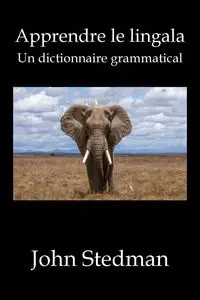Apprendre le lingala - John Stedman
- Un dictionnaire grammatical
One of the most widely spoken and most beautiful Bantu languages is Lingala. Lingala is spoken by tens of millions of people in Central Africa and has the status of a national language in the Democratic Republic of Congo and the Republic of Congo. It is an expressive and dynamic language, both complex and relatively easy to learn, thanks to the internal logic of its structure. It has become the lingua franca in a large part of Africa, far beyond the borders of the two Congos, thanks in part to the great success of Congolese music. Lingala is part of the Bantu family, the best-known members of which are perhaps Zulu, Swahili, Shona, Xhosa and Kikongo. Unlike these languages, Lingala has lost much of the grammatical agreements that characterize most other members of the family. Nevertheless, Lingala is complex, hence the need for a grammatical dictionary. Because of the particular structure of the Bantu languages, which is totally alien to the logic of European languages, a traditional dictionary is of little use to those who are taking their first steps in learning Lingala. Indeed, most of the words of a Bantu language are not found in dictionaries designed according to the Indo-European model. This new dictionary has therefore been conceived according to a system which helps beginners and advanced speakers to discover the logic of the Bantu
language system. Lingala is constantly evolving. This dictionary reflects current trends, modern Lingala as it is spoken in Kinshasa and Brazzaville - not to mention the huge Congolese diaspora in Europe and North America. We do though take full account of the more conservative and traditional variety of Lingala, sometimes known as makanza. This dictionary is the result of twenty years of work in close collaboration with Congolese experts in translation and lexicography spent in the DRC, the Republic of Congo and with the Congolese diaspora in Europe. We would like to thank them for giving us the opportunity to tap into their vast knowledge. We would like to share some of it with you.
This dictionary, and its companions in the series, uses a ground-breaking new system to help learners with some of the difficulties that learners of Bantu languages often face. These are some of the innovative and original features of our books:
Underlining of verb roots: Lingala is in the Bantu group. A characteristic of all Bantu languages is that they are built up from verb roots. We propose a new system wherein all verb roots are underlined to enable the researcher to make connections easily between seemingly unrelated words. For example, whereas the English words 'teacher', 'school' and 'lesson' have no obvious common etymology, by underlining the root in the equivalent word in Lingala moteyi, eteyelo and liteya, we see instantly that they are all derived from the verb root -tey-, meaning 'to teach'.
Grammatical boxes in the body of the dictionary: Bantu languages use affixes to modify the meaning of the root, making dictionaries arranged according to the traditional pattern of very limited use for those not familiar with the grammatical structure. Many words in any given Bantu text will not feature as headwords. We have therefore used an original method, incorporating these affixes into the body of the dictionary, along with a brief grammatical explanation of their function, to enable the user to find the meaning of the word being researched. These boxes have a border to distinguish them from the headwords. Explanation of cultural features: Many words relating to cultural practices and realities have no equivalent in European languages. Small articles within the body of the dictionary will describe and explain these features.
Le lingala est parlé par des dizaines de millions de personnes en Afrique centrale et a le statut de langue nationale en R
EAN: 9783982661001





